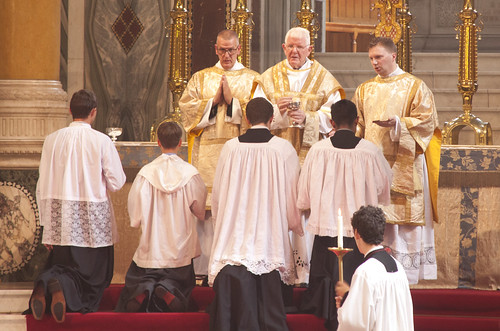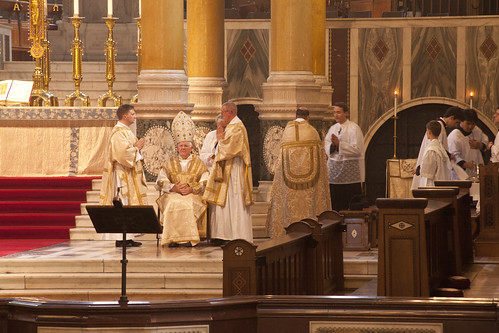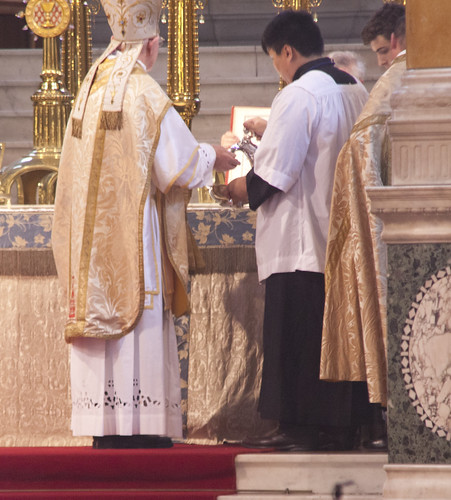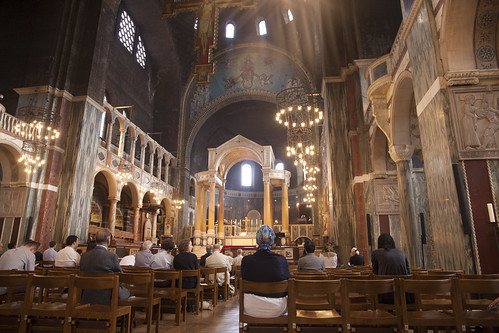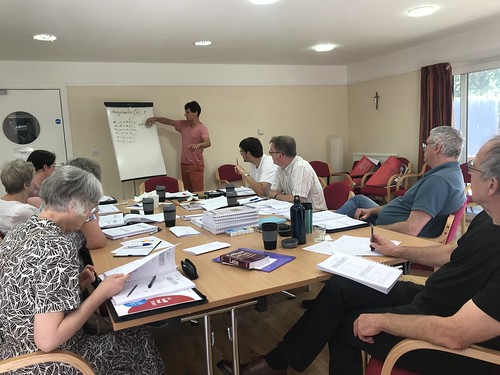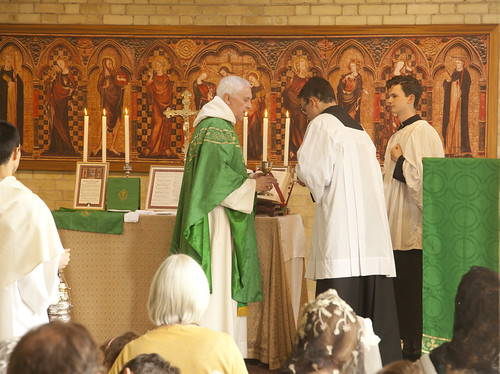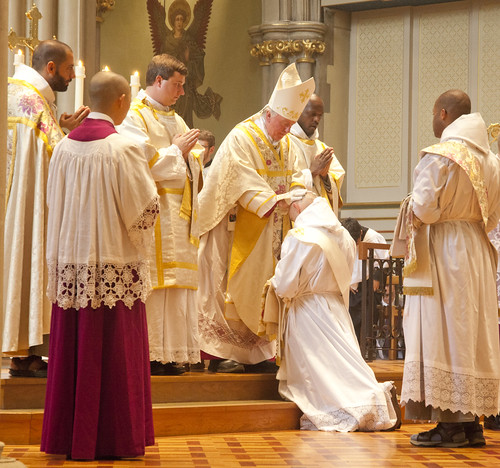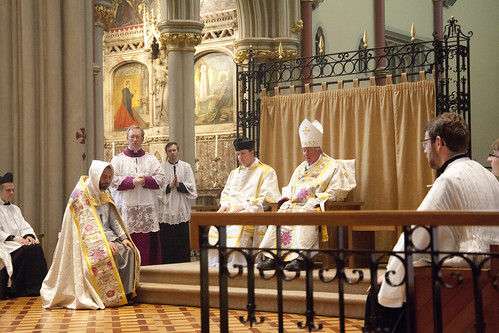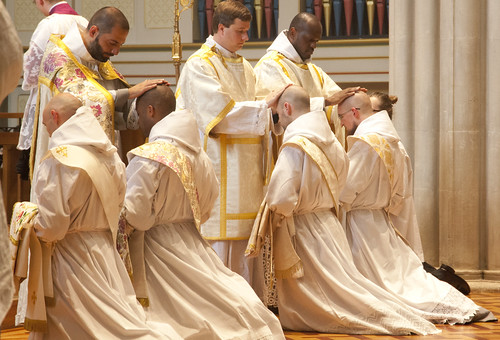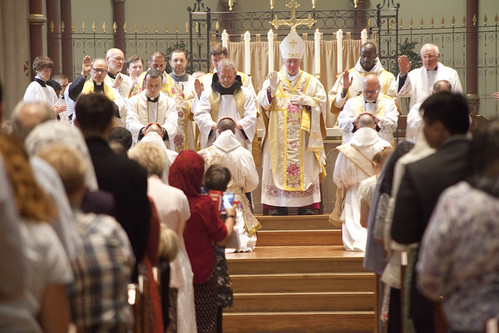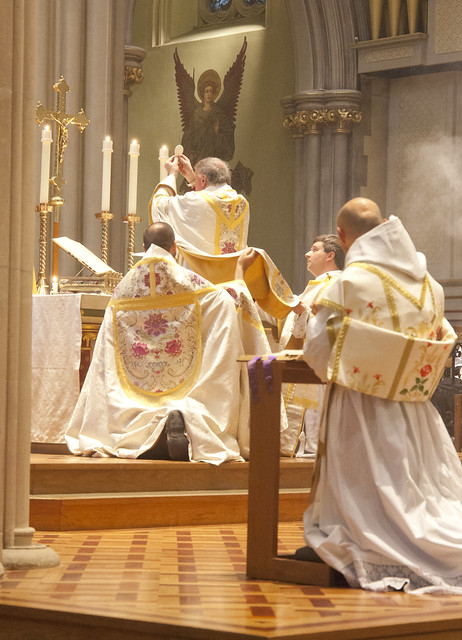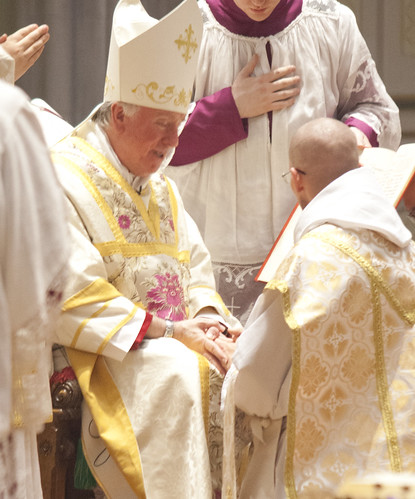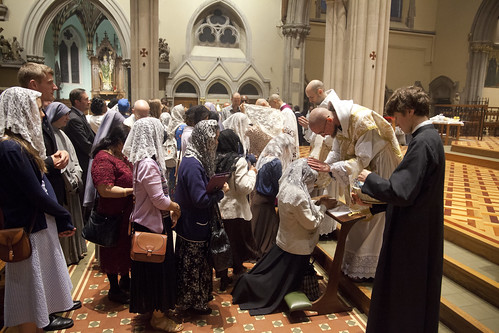Chairman's Blog
Two ideas for stemming lapsation
AGM Mass in Westminster Cathedral
People are not quite so starved of the Traditional Mass today, and this one Mass doesn't attractice such an enormous crowd. About that many people, by my estimation, attend a Latin Mass on any given Sunday. Many of those at the Mass in 1972 probably hadn't attended any for a year or more. Indeed, most Masses were celebrated in the vernacular from 1965, and at the same time the rubrics and prayers began to chance quite radically.
It is a reflection of the febrile atmosphere that the report of this Mass in 1972 is the first mention the Catholic Herald made to the 'Indult granted last year to England and Wales by the Pope at the Cardinal's request'. Why hadn't they mentioned it when it was granted? It had been reported in full in The Times, whose editor, William Rees-Mogg, was one of the petitioners, along with Agatha Christi, asking for it. The Catholic papers were told to keep it quiet.
Although not as well-attended as in 1972, our AGM was, as always, a jolly affair. We provide sandwich lunch (with wine) to attendees (on payment of a nominal £5) and it is a chance for anyone to talk to the Society's Officers (and staff) formally, at the meeting, or informally, over lunch. We were addressed by Bishop Campbell who gave us a little talk about St Augustine of Hippo: he is an Augustinian. We look forward to seeing him again at the Annual Requiem in Westminster Cathedral, which falls on All Souls Day this year.
Support the Latin Mass Society
Why do people lapse? More from Stephen Bullivant
 My latest on LifeSiteNews. This post focuses on a shorter book of Prof Bullivant, which has also come out this year. One of the interesting and perhaps counter-intuitive results of the survey of lapsed Catholics he carried out for Portsmouth Diocese is that the lapsed are not all what you might call liberal ex-Catholics: they include a fair number of conservative or even traditionalist ex-Catholics. I think it might be tempting to think of the more conservative type of Catholic as the core vote who are least likely to leave, people with a higher level of committment. The truth is more complicated. People who want traditional liturgy, beautiful churches, and clear teaching, can lose heart and lapse. Indeed, 10% of respondents even agreed (or 'strongly agreed') with the statement 'I prefer the Latin Mass but there is none in my area.'
My latest on LifeSiteNews. This post focuses on a shorter book of Prof Bullivant, which has also come out this year. One of the interesting and perhaps counter-intuitive results of the survey of lapsed Catholics he carried out for Portsmouth Diocese is that the lapsed are not all what you might call liberal ex-Catholics: they include a fair number of conservative or even traditionalist ex-Catholics. I think it might be tempting to think of the more conservative type of Catholic as the core vote who are least likely to leave, people with a higher level of committment. The truth is more complicated. People who want traditional liturgy, beautiful churches, and clear teaching, can lose heart and lapse. Indeed, 10% of respondents even agreed (or 'strongly agreed') with the statement 'I prefer the Latin Mass but there is none in my area.'
You know how many lapsed Catholics there are? The massive and authoritative British Social Attitudes Survey indicates that there are 3.7 million in the UK. If anything like 10% of these, plus who knows what percentage of practicing Catholics, prefer the Latin Mass, even when most Catholics under 70 do not even know what it is like, then our bishops are clearly missing a trick in not making sure it is available.
-----------
Prof Bullivant on What Went Wrong after Vatican II
I'm going to be writing more about Prof Bullivant's new book, Mass Exodus, which examines the catastrophic decline of Catholic affiliation and practice since the Second Vatican Council, from a sociological point of view.
Here is a piece I have written for LifeSiteNews.
LMS Latin Course: book now
For details and booking see the LMS website here.
Dates: 29th July to 2nd August 2019
The Latin Mass Society’s Residential Latin Course for adults is an intensive course, taught by two experienced tutors, focusing on the Latin of the liturgy.
It is ideal for priests and seminarians wishing to improve their Latin, and all clerics and seminarians (and those about to enter seminary) enjoy a 50% discount on the course fees, which are extremely low anyway.
They are joined by lay men and women who wish to engage more closely with the ancient Latin liturgy, or do studies involving Latin.
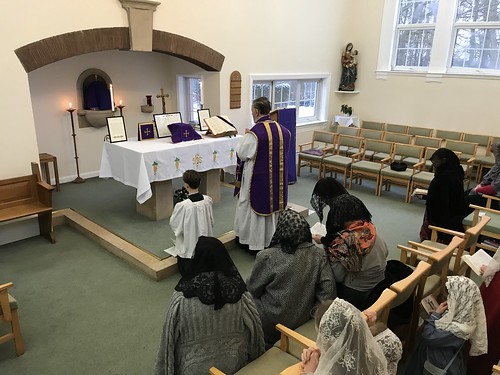 |
| Mass celebrated by Fr John Hunwicke at Boars Hill for the Guild of St Clare sewing retreat |
The Dominican Rite in Cambridge
On Sunday, a First Holy Communion took me to Cambridge Blackfriars, a place I have not visited before. The Dominican priory churches in Oxford, London, and Leicester, where I have attended Mass, are large and impressive neo-gothic buildings; for various reasons the Cambridge Blackfriars is very modest. The chapel was, I am told, originally intended as a lecture-room, but plans for a chapel elsewhere were shelved for various reasons.
Nonetheless, the chapel was packed, and a beautiful Mass was celebrated by Fr Aidan Nichols OP, and accompanied by a five-strong local schola. This Mass, at 9:15am, takes place every Sunday, either Sung or Low.
Friars ordained by Bishop Egan: photos
Last night Bishop Philip Egan ordained four members of the Franciscan community based in Gosport, in his cathedral in Portsmouth: St John's. I was there.
The community at Gosport is called the Family of Mary Immaculate and St Francis. This is an institute of diocesan right established by Bishop Egan, and the superior is Fr Serafino Lanzetta. At their parish in Gosport, which comprises St Mary's and St Columba's churches, they celebrate both Forms of the Roman Rite. The ordinations took place in the older Rite. The new priests are Fr Philomeno and Fr Rosario, who will be familiar to readers who have attended the LMS Walsingham Pilgrimage, and Fr Faustino and Fr Michele.
Support the Latin Mass Society
Is this a persecution of the Old Mass?
My latest on LifeSiteNews.
Successful book launch
Thanks to everyone who joined us at the launch for The Case for Liturgical Restoration in the St Wilfrid Hall at the London Oratory.
We were joined by Felipe Suarez, President of the Una Voce Federation (FIUV). It is him on the left in the top picture.

Buy the book here (in the UK), or from Amazon; here is the publisher's page.
Endorsements:
The Order of Malta: article in the Catholic Herald
I'm on the front cover of the Catholic Herald this weekend. My article begins:
Fra’ Giacomo Dalla Torre, the Grand Master of the Order of Malta, has informed members that henceforth all Masses celebrated in the context of Order events must be celebrated according to the Ordinary Form: that is to say, there must be no more Traditional Latin (Extraordinary Form) Masses.
This will come as a heavy blow to many of those associated with the Order in England and Wales, where it has long had celebrations in both Forms. It is one more example of an ongoing problem, however: that even as the Church’s ancient liturgy becomes more and more a normal part of Catholic life around the world, some religious orders have found it difficult to handle.

